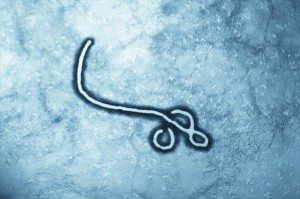What You Need To Know About The Ebola Virus
 Ebola virus disease (EVD) is acute, but can be fatal if it is left untreated. Ebola originally surfaced back in 1976 in Nzara, Sudan, Yumbuku, and near the Ebola River, hence how it got its name. The first reported case related to the most recent outbreak was in March of this year. Since then a major outbreak in West Africa has ensued, from which multiple Americans have become ill. Ebola is originally spread from a wild animal to a human, and from there it is spread human-to-human.
Ebola virus disease (EVD) is acute, but can be fatal if it is left untreated. Ebola originally surfaced back in 1976 in Nzara, Sudan, Yumbuku, and near the Ebola River, hence how it got its name. The first reported case related to the most recent outbreak was in March of this year. Since then a major outbreak in West Africa has ensued, from which multiple Americans have become ill. Ebola is originally spread from a wild animal to a human, and from there it is spread human-to-human.
While the CDC confirms the actual risk for a widespread Ebola outbreak in the US is minimally low, people everywhere are still highly concerned—but should you be? Here we break down everything you need to know about Ebola.
How Is Ebola Spread?
Ebola is easily transmitted because all it takes is a microscopic tear in your skin and a very small amount of the disease can enter and make you sick. Since, Ebola is NOT spread through air, water, food, or mosquitoes it isn’t spread quite as easy as many tend to assume. In order to transmit Ebola there must be actual contact with blood or body fluids from an individual currently experiencing active symptoms related to Ebola. Before symptoms arise Ebola is not contagious. (Read more from the WHO)
Ebola Symptoms
After Ebola is transmitted it will take 2 to 21 days before symptoms start to surface, although symptoms usually occur between 8 and 10 days post exposure.
The most common symptoms of Ebola include:
- Fever
- Severe headache
- Muscle pain
- Weak, tired
- Vomiting, diarrhea
- Stomach pain
- Mysterious bleeding or bruising, signs of hemorrhaging
Ebola symptoms often start just like any other ordinary illness, such as the stomach flu. This is why people often wait too long to receive treatment, they don’t realize from the get-go how seriously ill they are.
With everyone on heightened alert, more people with fevers and stomach aches have been showing up at Urgent Care Centers and ER’s across the nation. After all, how do you know the difference between the common cold and Ebola? Diagnosing Ebola requires at least one of multiple medical tests. If you live in Florida, or anywhere in the US, chances are that you are experiencing the flu over Ebola. Of course, you never want to dismiss the possibility, so visiting your local medical provider is always recommended.
The sooner you receive proper medical attention, the more likely you are to recover from Ebola. If you develop any symptoms associated with Ebola visit your local emergency room as soon as possible, and avoid contact with others.
Ebola Treatment
There is not yet an official treatment for Ebola, medical scientists are currently working as fast as they can to create a vaccine but these things take time. Medical treatment for Ebola currently includes:
- Rehydrating the body with oral or intravenous fluids
- Monitoring blood pressure
- Replenishing lost blood
- Identifying and treating associated infections
Read more on Ebola treatment here
These symptomatic treatments may not be guaranteed to save your life, but they are proven to increase your chances of survival. Other methods are currently being used as more of a test than anything for patients, such as the blood transfusions that successfully treated the infected nurse from Dallas. There are also 2 different potential vaccines that are moving through human safety testing stages right now.
Can You Survive Ebola?
The average fatality rate for those with Ebola is about 50%. Some people are able to develop the antibody necessary to fight off the disease and make a full recovery. Those that recover from Ebola are found to develop antibodies that will remain in their blood for up to 10 years. The Doctor from New York that was able to battle off the disease donated his blood, intact with Ebola fighting antibodies, to the Texas nurse. As a result, she has made a recovery from the virus and returned home.
How To Protect Yourself
The best way to prevent Ebola is to avoid any possible contact with bodily fluids from someone displaying symptoms of illness. You should also wash your hands regularly and avoid traveling to regions currently impacted by the Ebola virus. The CDC has set a Warning Level 3 on the following travel destinations: Liberia, Sierra Leone, and Guinea. There is also a Warning Level 2 in place for the Democratic Republic of the Congo (DRC).
CDC staff is checking all passengers for fever or other signs of illness 24/7 at all 5 US airports that connect to countries experiencing an Ebola outbreak. All travelers that do not show symptoms of the virus will be monitored on a daily basis to ensure they do not develop any symptoms throughout the entire incubation period of 21 days.
Being cautious and reducing unnecessary risk can help you avoid Ebola, as well as every other virus out there.

